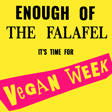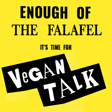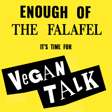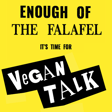
193- Vegan football kits: Is Dale Vince barking up the wrong tree frog?!
If you've not seen Forest Green Rovers' latest 'Vegan Certified' football kit, you soon will- it certainly isn't bland. But what makes a football kit vegan, and should we care? As well as this, Julie, Mark & Anthony also look at a dozen or so news stories from the vegan & animal rights space from the last week or so.
****************
Enough of the Falafel is a community of people who love keeping on top of the latest news in the world of veganism & animal rights. With the Vegan Week podcast, we aim to keep listeners (& ourselves) informed & up-to-date with the latest developments that affect vegans & non-human animals; giving insight, whilst staying balanced; remaining true to our vegan ethics, whilst constantly seeking to grow & develop.
Each week we look through news stories from the past 7 days in the world of veganism & animal rights.
If you spot any news stories that might catch our fancy, or have an idea for a discussion topic, get in touch via enoughofthefalafel@gmail.com.
*******************
This week's stories:
https://www.four-paws.org.uk/our-stories/blog-news/big-news-for-calves-stena-line-halts-calf-exports-from-ireland-to-france#:~:text=Ireland%20to%20France-,Big%20news%20for%20small%20calves%3A%20Stena%20line%20halts,exports%20from%20Ireland%20to%20France&text=This%20is%20hugely%20welcomed%20news,%2C%20Ireland%20to%20Cherbourg%2C%20France.
https://www.news-medical.net/news/20250722/Vegan-diets-support-high-level-training-but-risks-of-muscle-loss.aspx
https://www.scmp.com/news/world/europe/article/3318932/activists-protest-against-planned-killings-german-zoos-baboon-enclosure
https://www.dutchnews.nl/2025/07/vion-first-to-face-complaint-via-oecd-animal-welfare-guidelines/
https://www.independent.co.uk/news/uk/home-news/plant-milk-nutrition-children-cows-uk-government-b2790127.html
https://plantbasednews.org/animals/farmer-claims-slaughterhouse-screaming-edited/
https://www.farminguk.com/news/iceland-pledges-cage-free-by-2027-after-activist-pressure_66937.html
https://www.hindustantimes.com/cities/mumbai-news/hc-upholds-animal-rights-over-religious-customs-101752693484088.html
https://www.brecon-radnor.co.uk/news/animal-rights-group-peta-unfurl-banner-in-builth-wells-on-first-day-of-royal-welsh-show-814442
https://wamiz.co.uk/news/189500/somerset-golden-retriever-attraction-shut-down-as-owner-banned-animal-cruelty
https://www.nytimes.com/2025/07/21/nyregion/central-park-carriage-driver-not-guilty-animal-cruelty.html
https://www.bbc.co.uk/news/articles/cj61l252yz9o
****************
Thanks everyone for listening; give us a rating and drop us a message to say "hi"; it'll make our day!
Mark, Julie & Ant



